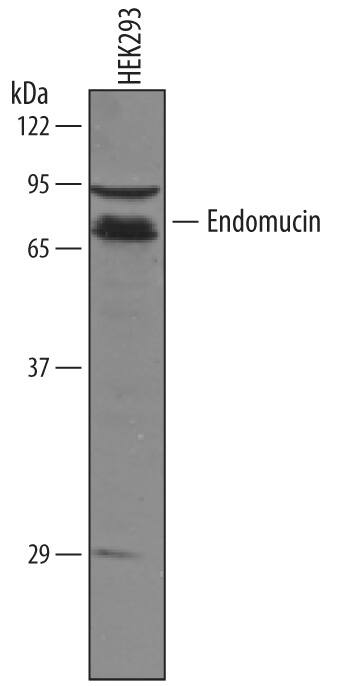Human Endomucin Antibody
R&D Systems, part of Bio-Techne | Catalog # AF7206

Key Product Details
Species Reactivity
Applications
Label
Antibody Source
Product Specifications
Immunogen
Asn19-Gly139
Accession # Q9ULC0
Specificity
Clonality
Host
Isotype
Scientific Data Images for Human Endomucin Antibody
Detection of Human Endomucin by Western Blot.
Western blot shows lysates of HEK293 human embryonic kidney cell line. PVDF membrane was probed with 1 µg/mL of Goat Anti-Human Endomucin Antigen Affinity-purified Polyclonal Antibody (Catalog # AF7206) followed by HRP-conjugated Anti-Goat IgG Secondary Antibody (Catalog # HAF019). Specific bands were detected for Endomucin at approximately 80 to 95 kDa (as indicated). This experiment was conducted under reducing conditions and using Immunoblot Buffer Group 8.Applications for Human Endomucin Antibody
Western Blot
Sample: HEK293 human embryonic kidney cell line
Formulation, Preparation, and Storage
Purification
Reconstitution
Formulation
Shipping
Stability & Storage
- 12 months from date of receipt, -20 to -70 °C as supplied.
- 1 month, 2 to 8 °C under sterile conditions after reconstitution.
- 6 months, -20 to -70 °C under sterile conditions after reconstitution.
Background: Endomucin
Endomucin (Endothelial sialomucin; also MUC-14, Endomucin-2 and Ga34) is an 85-115 kDa glycoprotein that belongs to no known family of molecules. It is expressed by primitive bone marrow stem cells, endothelial cells of both blood and lymphatic vessels, and select keratinocytes. Endomucin appears to create an environment that discourages leukocyte binding to vascular walls, and yet may also serve as an L-Selectin ligand. Mature human Endomucin is a 243 amino acid (aa) type I transmembrane glycoprotein (aa 19-261). It contains a 172 aa extracellular domain (ECD) (aa 19-190) plus a 50 aa cytoplasmic tail (aa 212-261). The ECD possesses a uteroglobin-like domain (aa 19-74) plus multiple sites for N- and O-linked glycosylation. There are potential splice variants that seem to parallel those in mouse. One shows a deletion of aa 140-222 and is likely soluble, while another possesses a Ser substitution for aa 126-139. Over aa 19-139, human Endomucin shares only 35% aa identity with mouse Endomucin.
Alternate Names
Gene Symbol
UniProt
Additional Endomucin Products
Product Documents for Human Endomucin Antibody
Product Specific Notices for Human Endomucin Antibody
For research use only
